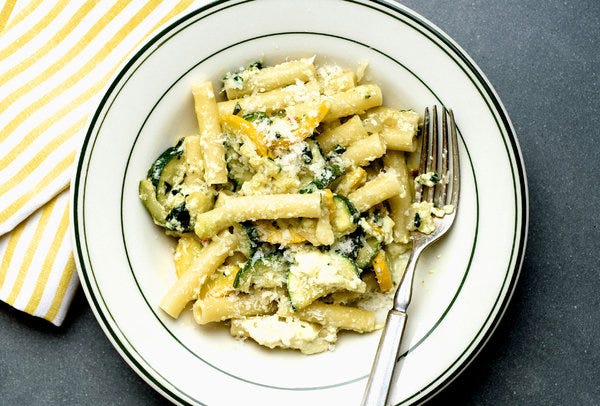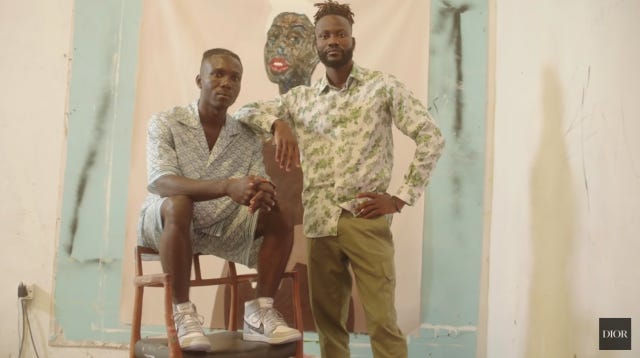Good trouble, summer pasta, Amoako Boafo for Dior, and more.
Digest #6 - July 19th 2020
Good trouble, summer pasta, Amoako Boafo for Dior, and more.Digest #6, July 19th 2020
One
As one of the original thirteen Freedom Riders, Congressman John Lewis put his own life on the line to transform America. He confronted racism directly, never shying away from speaking out and taking bold actions, while remaining steadfast in his commitment to non-violence. He was attacked by white mobs and the KKK, beaten bloody and unconscious, arrested for peaceful protests, and left in vermin-infested jail cells, over and over again. All this so that we Black Americans can enjoy the civil rights we have today. Without the critically important work he did to end segregation, with his own body and blood, I simply would not exist. But this fight is not done. We owe him, and his legacy, to keep going. Rest in peace and power, Congressman Lewis. Thank you for everything you did for us, and for this country.
I want to see young people in America feel the spirit of the 1960s and find a way to get in the way. To find a way to get in trouble. Good trouble, necessary trouble. - John Lewis
June 7, 2020: Lewis looks over a street in Washington DC that's been renamed Black Lives Matter Plaza. Photo by Khalid Naji-allah, Associated Press.
Two
It's the middle of summer in the Northern Hemisphere, and for Atlanta that means it's hot. What I never realized growing up in the Western Australian heat is that even though temperatures frequently exceed 40 degrees Celsius (104F) in the Summer, Perth is privileged to be on the coast. A sea breeze called the Fremantle Doctor arrives like clockwork daily. Atlanta has no such natural phenomenon, and there's no sea to give us cool winds. Humidity sits high, and we have a lot of hot summer rains. This makes light dishes like this delicious summer pasta with basil, ricotta and zucchini an absolute must. This is simple but so, so good, and pairs well with a glass of prosecco on our back deck, under the umbrella with the fan blasting in our direction. I'm still non-dairy because of Leo's milk allergy, but the cashew-based ricotta and Parmesan substitutes have worked well. A small tip: we also use Banza chickpea pasta these days, instead of the normal kind, because it tastes just as good but is packed with protein.
Photo by Karsten Moran for The New York Times.
Three
Ghanaian artist Amoako Boafo recently collaborated with Kim Jones, Artistic Director at Dior, to create their men's summer 2021 collection. In this hauntingly beautiful 10-minute short film 'Portrait of an Artist', which premiered this week, Boafo explains his artistic sensibilities, unique finger painting technique, and the role of fashion and style in his work. I find this particularly interesting because obviously given the circumstances of the world amidst COVID19, a traditional show wasn't possible. Dior has turned to a different storytelling medium, film, to tell Boafo's story and to exhibit the collection. For me, this is an exciting and dynamic way to share fashion, probably because it's so inclusive. The vast majority of us outside of the industry who enjoy fashion as an art form, will never be invited to sit along one of those runways. But here, we get to be fully immersed and included in the experience. And what a tremendous one it is.
A still from the short film. Boafo is pictured right, with an unnamed artistic subject (likely a friend or family member based on context provided in the film).
Four
I took a very long time to jump on the Spotify train, but I'm now glad I did. Two days ago Jamaican reggae artist Koffee (mentioned in Digest #2) released a new song, "Lockdown", and Spotify very kindly emailed to let me know. The song references being in quarantine both in its lyrics and its apt title, and is a perfect homage to the complex feelings we are experiencing at this time in history. It joyfully looks forward, asking how things will be when we come out on the other side. I can imagine myself playing this in 10 years to my son Leo, explaining how dark these times were for so many, how fortunate we were to have so much time together as a family at the beginning of his life, and also how grateful we'll forever be for 'simple' things like brunch or going to a museum. It's also a brilliant song; as much as "Toast" but in a different way. I'm beyond happy that her hits keep on coming! This is now my summer quarantine anthem, and a week ago I didn't think such a thing could exist.
Where will we go when di quarantine ting done and everybody touch road?
A screenshot from the music video.
Five
It's funny to reflect on my secondary education now as an adult; to think about all the educational resources I largely took for granted. If only my days were still filled with art, dramatic studies, novels and poetry, as they were back in the 00s. It was an intellectually indulgent time, and I didn't have the full weight of adult responsibility on my shoulders (as I did at university, at least compared to my peers). I've recently been doing something I never imagined I would, mostly because it sounds too whimsical to be real, but quarantine does weird things to people. I walk around the garden, with Leo in his carrier, and I recite my anthology of English Romantic poetry from year twelve (senior year) aloud. This volume features work from England's "six greatest Romantic poets": William Blake, William Wordsworth, Samuel Taylor Coleridge, Lord Byron, Percy Bysshe Shelley and John Keats. I am of course critical of the fact that we elevate so many wealthy, white, apparently-straight, cisgender men to this elite status, as though they're the only people who could have possibly produced good writing at this time. That said, I've found a particular magic in Blake's work and in his perspectives being so different to his contemporaries. This is perhaps because he was poor, mentally ill, and never knew fame while he was alive. I'm sharing with you one of my favorites, the poem "London", which contains beautiful language and imagery ("mind-forg'd manacles" is particularly powerful), while seriously examining key social issues of the time.
London
I wander thro' each charter'd street,
Near where the charter'd Thames does flow.
And mark in every face I meet
Marks of weakness, marks of woe.
In every cry of every Man,
In every Infants cry of fear,
In every voice: in every ban,
The mind-forg'd manacles I hear
How the Chimney-sweepers cry
Every blackning Church appalls,
And the hapless Soldiers sigh
Runs in blood down Palace walls
But most thro' midnight streets I hear
How the youthful Harlots curse
Blasts the new-born Infants tear
And blights with plagues the Marriage hearse
Six
On Instagram this week, via the account @dopeblackart, I came across this beautiful image by Seb Xavier (@seb_xavier) titled 'Icarus'. I thought this was an oil painting because it looks so ethereal and polished. But with the hashtag #photography, and credit to thirty models for pulling this off, it seems it's not! I am definitely of the school of thought that no interpretations of art are, or can be, wrong. In spite of the artist's intentions, once work is in the public domain, its meaning can no longer be dictated or controlled. Whatever you see in this image is yours to see, and experience. For me, aside from the clear references to Greek mythology, this is a timely reflection on modern culture's compulsion to document itself, and the destructive consequences this can have. In a super self-aware twist that I actually love, you can buy this image on a hoodie, and the artist is giving a large chunk (20%) of proceeds to the Stand with Hong Kong crowdfunding campaign.
'Icarus' by Seb Xavier, on Instagram.
Seven
As I always like to say goodbye with something light, I have to share this tweet with you. The video is silly and simple. But it made me laugh so hysterically I actually snorted my coffee up my nose somehow and then spent 10 minutes trying to get rid of that drowning feeling. You've been warned!








